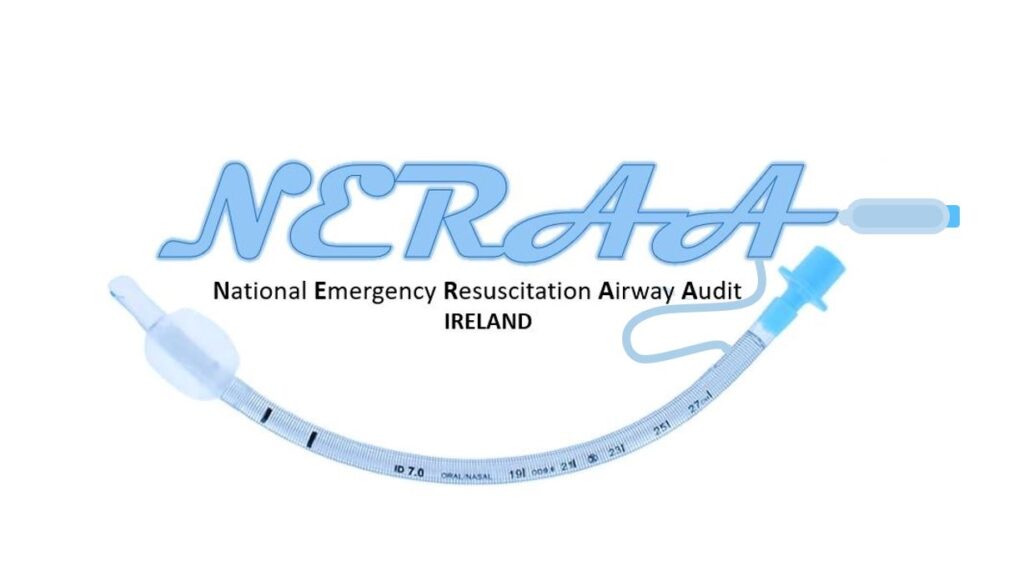National Emergency Resuscitation Airway Audit (NERAA): a pilot multicentre analysis of emergency intubations in Irish emergency departments
https://bmcemergmed.biomedcentral.com/articles/10.1186/s12873-022-00644-2
Abstract
Background
There is paucity of literature on why and how patients are intubated, and by whom, in Irish Emergency Departments (EDs). The aim of this pilot study was to characterise emergency airway management (EAM) of critically unwell patients presenting to Irish EDs.
Methods
A multisite prospective pilot study was undertaken from February 10 to May 10, 2020. This project was facilitated through the Irish Trainee Emergency Research Network (ITERN). All patients over 16 years of age requiring EAM were included. Eleven EDs participated in the project. Data recorded included patients’ demographics, indication for intubation, technique of airway management, medications used to facilitate intubation, level of training and specialty of the intubating clinician, number of attempts, success/complications rates and variation across centres.
Results
Over a 3-month period, 118 patients underwent 131 intubation attempts across 11 EDs. The median age was 57 years (IQR: 40–70). Medical indications were reported in 83% of patients compared to 17% for trauma. Of the 118 patients intubated, Emergency Medicine (EM) doctors performed 54% of initial intubations, while anaesthesiology/intensive care medicine (ICM) doctors performed 46%. The majority (90%) of intubating clinicians were at registrar level. Emergency intubation check lists, video laryngoscopy and bougie were used in 55, 53 and 64% of first attempts, respectively. The first pass success rate was 89%. Intubation complications occurred in 19% of patients. EM doctors undertook a greater proportion of intubations in EDs with > 50,000 attendance (65%) compared to EDs with < 50,000 attendances (16%) (p < 0.000).
Conclusion
This is the first study to describe EAM in Irish EDs, and demonstrates comparable first pass success and complication rates to international studies. This study highlights the need for continuous EAM surveillance and could provide a vector for developing national standards for EAM and EAM training in Irish EDs.
Previous news and updates to NERAA:
- by andrew
- 20th October 2019
We have been hard at work behind the scenes to bring you our first trainee led research project, the National Emergency Resuscitation Airway Audit (NERAA).
What this study entails:
This study requires prospective data entry regarding the practice of RSI and intubation in critically unwell patient’s in the ED. Consecutive adult patients presenting to the ED requiring airway intubation over the study period of 2 months will be collected. Once you sign up, you will be given a study pack and guidance on how the study should be run in your department. Ethics and Auditing committee advice will be given once registered as a Principal Investigator (PI).
What do you get out of this:
Everyone involved in data collection will get an ITERN Certificate to prove involvement. Data collector names will be published as ITERN collaborators (think CRASH3 collaborators). You also get experience of being a PI or data collector for a National Study. Participating in ITERN projects will provide opportunities for presentation of projects as part of being a local PI, involved in statistical analysis and manuscript preparation.
Study Background:
Over the last few decades Emergency Medicine in Ireland had been a rapidly evolving speciality. Emergency airway management is an integral component of management of the critically unwell patient. Internationally, and within Ireland, there is significant variation in personnel and practices around rapid sequence induction (RSI) and intubation of patients in the Emergency Department (ED). Although emergency airway management is frequently performed in Irish EDs today, there is a paucity of literature on why and how patients are intubated, and by whom.
Study Objectives:
• Define current practices around the RSI and intubation of the critically unwell in the ED
• Compare practices against internationally accepted guidelines eg NAP 4 recommendations.
• Identify areas of improvement for education and training.
• Contribute to patient safety by development of national clinical practice guidelines allowing standardisation of the approach to emergency airway management
NERRA IRL Study Update
- by andrew
- 6th February 2020
Its here! The first ever Emergency Medicine trainee led, multi-site study is about to commence. Thank you to all the sites who have signed up for what should be an exciting development for EM trainees in Ireland! We are delighted to be in collaboration with the Emergency Airway Registry Ireland group (EMARI) on this project, leading to the development of an airway registry for Irish EM.
This study has just received approval by the Mater Research and Ethics Committee.
An information pack has been sent to the Primary Investigators on all the research sites and data collection will begin very soon!
